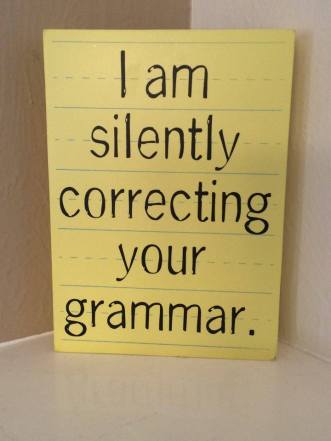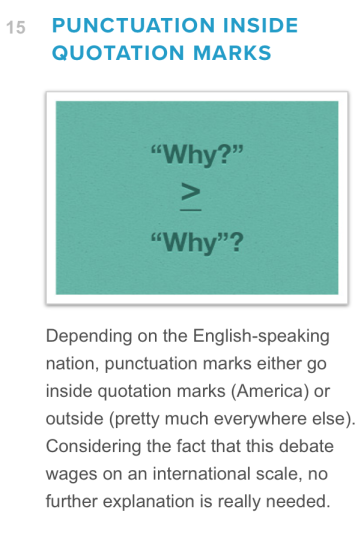There are many rules that govern our writing and language use. Ever useful, sometimes changing, and occasionally bizarre.
There are some rules I just can’t seem to learn. My brain refuses to let them in, and I have to look them up every single damn time I need to use them. One of those is the lay/lie/laying/lying differences. Grammar Girl comes in handy with that one.
But most of the time, as a proponent of writing correctly, I do a decent job at spotting errors in grammar, punctuation, and spelling. And this is true:

This is an actual thing in my dining room. Mom bought it for me.
Even so, there are a few rules that are just dumb and I’m less strict about.
Dumb Rule 1: All right, alright, all-right
That last one isn’t real. I just wanted the McConaughey reference.

I was stubborn about this one for a long time. In my mind, “all right” means “completely correct” and “alright” means “okay.” I used “alright” in dialogue, and “all right” sounded/looked stuffy to me. And then there’s this:

Credit: Analytical Grammar
All though they were there all ready, it was all together a chaotic situation, all right.
Blah.
Dumb Rule #2: Regional spelling differences
There are some rules that only exist because America.

And they only exist in America.
Take toward/towards, for example.
Or all those words that lost their “u” on their trip across the pond/over the Canadian border: What’s your favourite colour?
I don’t write those words with the added “u,” but I do write and say “towards.” I also get comments on it in the critique group frequently enough to notice.
 Me: She walked towards the store.
Me: She walked towards the store.
CP: Towards in the UK, toward in the US.
Ugh.
This is one I won’t budge on, mainly because I say towards and I think it sounds better. Not everything we Americans do “just because” is the right thing.
Dumb Rule #3: Punctuation always goes inside the quotes (but only in America!)
Look, it’s another regional-specific rule!

Credit: onlinecollege.org
I’ve had to correct myself because of this rule about half a dozen times just in this post. Unlike “towards,” I try to follow the US rule on this one because more people fuss about it and I don’t want to die on that hill. That said, it makes sense to me that a quoted word or phrase (I’m not talking about dialogue here, by the way) should be considered its own entity and not have punctuation invading it.
Those are my top three dumb writing rules. What rules would be on your list?



I just struggled with lay/lie/laying/lying twice in just the last few days. I write mostly poetry, so my grammar is my own. I do like the art of diction and proper use of definition!! I enjoy your posts and shall follow.
Kevin
LikeLiked by 1 person
I don’t know why I can’t learn those lay/lie differences. Maybe my brain doesn’t think those rules are worth the space.
Thanks for reading and commenting, and welcome to the blog! 😊
LikeLike
At some point, grammar decisions become the intersection of location, authenticity, and not wanting to “die on that hill.” (Punctuation inside quotation marks because, well, American.)
Love this post.
LikeLiked by 1 person
Yep, exactly. You gotta use what fits the story.
Thanks for reading and commenting! I’m glad you enjoyed the post. 🙂
LikeLiked by 1 person
Hi Allison! Per your earlier permission, I scheduled this article to be featured as a guest post on Feb 18th. As usual, it has your credit/bio/link. Thanks!
LikeLiked by 1 person
Great! Thanks!
LikeLiked by 1 person
Pingback: Dumb Writing Rules – Proof Perfectly
There are also a lot of grammar points that drive me nuts, but, interestingly, none of ours coincide. One that comes to mind is the whole and/or/nor/for/but comma dilemma. It’s really more a stylistic choice when to use one before a conjunction than a strict right or wrong (OK, SOMETIMES there’s clear right and wrong).
LikeLiked by 1 person
Ah, good old “comma FANBOY.” I agree it’s a stylistic choice for compound sentences. I use both, depending on how I want the writing to sound.
LikeLiked by 1 person
Pingback: What Did You Like? 2016 In Review | Allison Maruska
Damn, I spelled ‘Murican wrong in a recent post on my blog.
LikeLiked by 1 person
That’s probably subject to regional spelling rules too. LOL
LikeLiked by 1 person
Pingback: Three Writing Rules That Are Kinda Dumb | Campbells World
Reblogged this on Plaisted Publishing and commented:
My pet hate was always – American’s tend to say Leaned and Drugged – rather than Leant and Dragged…It confused me for ages…lol
LikeLiked by 1 person
Leant! That’s new to me! I knew about learnt, as opposed to learned. I say dragged. I think drugged involves some kind of substance. LOL
Thanks for the reblog! 🙂
LikeLiked by 1 person
Welcoem and yes Learnt is another i use 🙂
LikeLiked by 1 person
I had so many issues when penning Scripting. London based, so they speak in English. American spell check went bananas. LOL
LikeLiked by 1 person
LOL. I bet! I wonder if there’s a preferred spelling setting you could use.
LikeLiked by 1 person
Ooh, I should so look at that. Thanks for the suggestion.
LikeLike
Reblogged this on Don Massenzio's Blog.
LikeLiked by 1 person
I never quite got the alright/all right thing. Thank you for kind of explaining.
LikeLiked by 1 person
I wonder if “alright” will be the standard in 50 years. Many writers use it even though it’s “wrong.”
LikeLiked by 1 person
She’s! What a relief. I say towards, or should I say I said towards until I got my first manuscript back from my editor and learned how very wrong my entire existence had been up to that point.
LikeLiked by 1 person
That was supposed to be shew
LikeLike
Autocorrect strikes again! 😉
LikeLike
I swear it has it out for me.
LikeLiked by 1 person
LOL. Right? At least you were shamed out of it. I’m still living a fractured existence.
LikeLiked by 1 person
Tricky. Being British I always use the u in spelling words, it just comes naturally and feels very unnatural when seeing the American spelling (don’t forget the missing i in America’s version of aluminium). I’ll admit that I tend to use ‘towards’, just always have and I don’t really see a difference in the two, same with ‘alright’. The lay/lie thing though is something that irritates me if it’s wrong. I spotted it in one authors book and it just sounds wrong whenever I see it – but being paranoid I actually spent time searching the web to make sure I know how the grammar difference (not to sound smug but I was right :p)
Punctuation thing never bothered me but now I don’t know which version’s right. I use it inside or outside depending on the sentence I’m using :o….Does anyone ever use/know the real grammar rules?
LikeLiked by 1 person
I think staunch editors must know all the rules. Your average reader likely won’t.
I’m glad you were right. 😉
LikeLiked by 1 person
:). I’m one of those people who knows something instinctively but as soon as someone says, ‘Are you sure?’ I start second guessing myself lol. I actually thought of becoming an editor in the past (a really badly edited book gave me the idea) but I’d probably need to check my grammar more first lol.
LikeLiked by 1 person
I write Minnesotan.
I guess I can get away with it in my blog because place is central to what I write about. If I were writing non-fiction for broader audience, I would have to change my style – and frankly, I don’t know how to do that.
LikeLiked by 1 person
Minnesotan = almost Canadian? LOL
If you can get away with a distinctive voice, keep it.
LikeLiked by 1 person
I’m Canadian, which means I’m stuck between American and British grammar rules. Officially, we’re supposed to do things the British way, but our country is so heavily influenced by America that most people write the American way. So yeah, I’m never sure what to do! Depends on who is reading my writing.
LikeLiked by 1 person
Ha! That sounds confusing. I thought you guys went the British way.
LikeLike
We do. Officially. But we’re flooded with more American media than British, like the books and news articles and magazines we read, and so American grammar sticks in most people’s heads.
LikeLiked by 1 person
I’ve had to look all those up in the past, and I’ve cemented my opinions to these:
1. “Alright” and “all right” are both correct, but usage is trending toward [ahem] the latter.
2. I use “toward” (“Yay. One less letter to type!”) and think it sounds much better.
I ain’t gonna go towards that building no more.
Modern economic theory is currently moving toward a more catholic set of principles.
3. For the question mark, it can sometimes go outside the quotes:
He said, “Do you want to know why?”
I wondered whether you had said, “I want to know why”?
LikeLiked by 2 people
Ack! Now I’ll hear “towards” with a southern accent. That’s not British at all! Maybe it will wear off. 😑
LikeLike
I’m a 100% British (75% English 25% Scot) 60 something and I’ve always put punctuation inside quotation marks and would write towards not toward, but of course I use the ‘u’ and like you always have to check out the lie/lay etc thing! I’m sticking to writing mostly dialogue so it’s not my fault how ‘he & she’ speak! As for dumb rules on my list .. none … I just make sure my Concise Oxford English Dictionary is within reach.
LikeLiked by 1 person
Right! Dialogue gets some leeway.
LikeLiked by 1 person